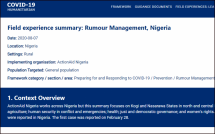Field Experience Summary: Rumour Management, Nigeria
Misinformation on COVID-19 in rural Nigeria was widespread. Rumors included that only those in cities, Egyptians, the rich, or people over 40 could get sick. In addition, rumours spread that alcohol consumption could prevent COVID-19 (based on the use of alcohol hand sanitizer), or that eating raw garlic could prevent it. While some of the stories and information were in the public domain prior to ActionAid Nigeria’s intervention in these communities, the precise levels misinformation in the community were brought to light during a preliminary visit to understand the needs of the population. The rumors meant that people were not taking proper precautions to avoid contracting the virus. In each of their communities they visited ActionAid Nigeria found that there was no social distancing, markets were full and worship centres crowded.
In addition, ActionAid Nigeria noticed that COVID-19 awareness campaigns focused heavily on urban centres, and that radio channels and posters tended to target urban populations. Many rural communities lack network coverage, meaning they had limited access to the media campaigns ongoing. They found that in rural villages, many people were not even aware that COVID-19 existed, and that life was carrying on as normal. The objectives of ActionAid Nigeria’s programme were to raise awareness of COVID-19 symptoms, prevention, and services, as well as to dispel myths.
To manage rumours and misinformation, ActionAid Nigeria have been running a ‘door to door’ campaign in rural communities. They have a team of 14 people in each community, including nine from their existing community team and five community facilitators
Source: COVID-19 Humanitarian
Date of Publication: June 16, 2021
SIMILIAR RESOURCES
Tools
Examples
- Tackling COVID-19 Fear and Stigma
- Skills Sessions: Rumour-tracking
- Gender-based Violence Prevention, Risk Mitigation and Response during COVID-19
- Who Self-Cares Wins
- Inoculation Against Misinformation
- How Might We Use Communication to Encourage Physical Distancing in Developing Countries
- Actions to Support Media, Enhance Access to Information, and Leverage Digital Technologies in the Fight Against the Pandemic
- Nutrition Critical: Why We Must Act Now to Tackle Child Malnutrition
- Engaging Men and Boys: A Brief Summary of UNFPA Experience and Lessons Learned
- Practical Guidance for Risk Communication and Community Engagement (RCCE) for Refugees, Internally Displaced Persons (IDPs), Migrants, and Host Communities Particularly Vulnerable to COVID-19 Pandemic

